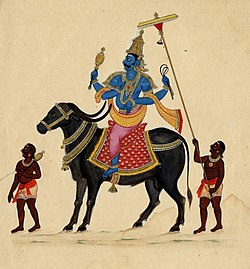

The mythology or religion of most cultures incorporate a god of death or, more frequently, a divine being closely associated with death, an afterlife, or an underworld. They are often amongst the most powerful and important entities in a given tradition, reflecting the fact that death, like birth, is central to the human experience. In religions where a single god is the primary object of worship, the representation of death is usually that god's antagonist, and the struggle between the two is central to the folklore of the culture. In such dualistic models, the primary deity usually represents good, and the death god embodies evil. Similarly, death worship is used as a derogatory term to accuse certain groups of morally abhorrent practices which set no value on human life. In monotheistic religions, death is commonly personified by an angel or demon standing in opposition to the god.
Contents
- Occurrence
- Africa and the Middle East
- Sub-Sahara Africa
- Afroasiatic Africa
- Afroasiatic Middle East
- Western Eurasia
- European
- Western Asia
- Uralic
- Eastern Asia
- Korean
- Chinese
- Japanese
- North and Central Asian mythology
- Oceanian mythology
- South Asian mythology
- Hindu
- Tibetan Buddhist
- Southeast Asian mythology
- Philippines
- Vietnam
- American mythology
- Aztec
- Cahuilla
- Guarani
- Haida
- Inca
- Inuit
- Latin American Folk Catholicism
- Maya
- Narragansett
- Taíno
- Umbanda and Candomblé
- Haitian Vodou
- See also
- References






